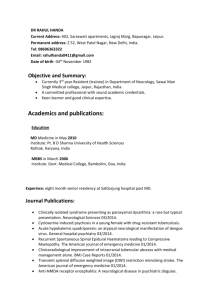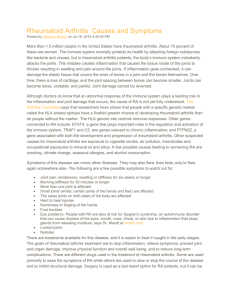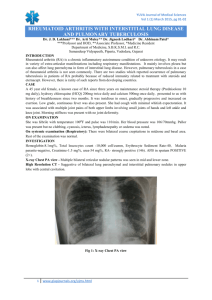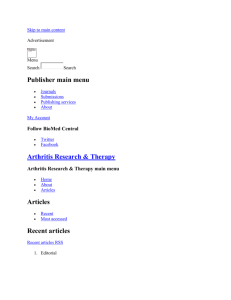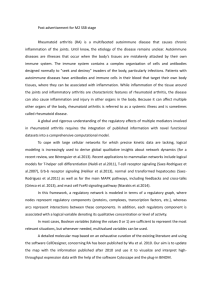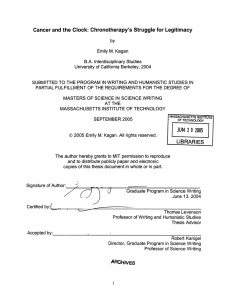Analysis of Complementary and Alternative Therapy Study
advertisement
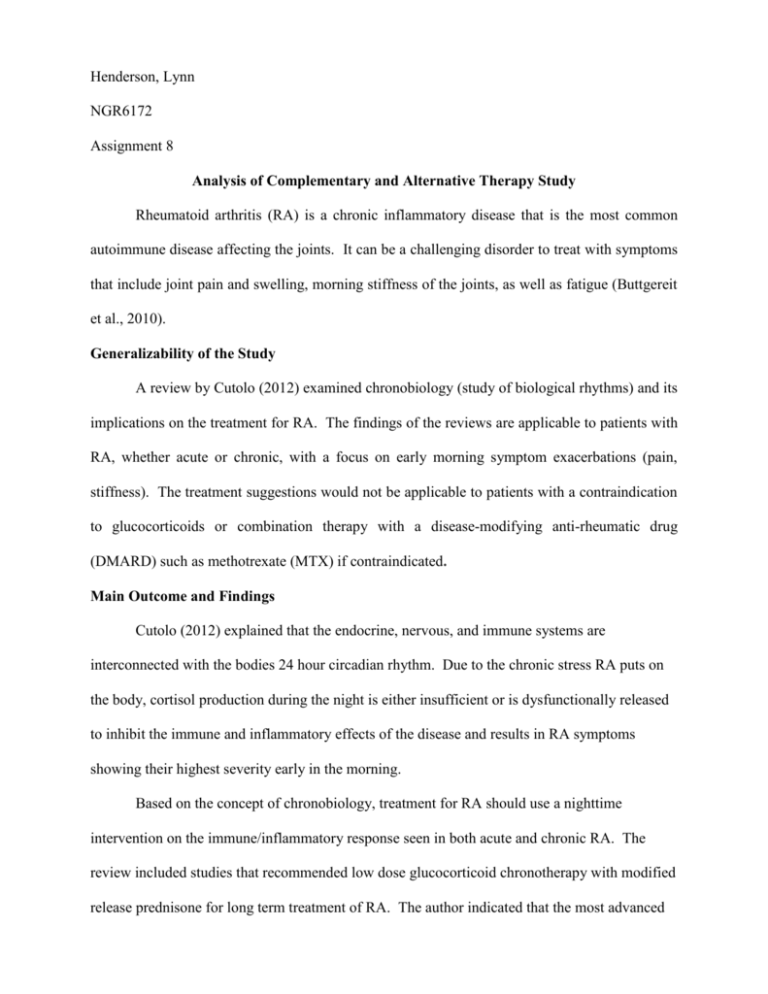
Henderson, Lynn NGR6172 Assignment 8 Analysis of Complementary and Alternative Therapy Study Rheumatoid arthritis (RA) is a chronic inflammatory disease that is the most common autoimmune disease affecting the joints. It can be a challenging disorder to treat with symptoms that include joint pain and swelling, morning stiffness of the joints, as well as fatigue (Buttgereit et al., 2010). Generalizability of the Study A review by Cutolo (2012) examined chronobiology (study of biological rhythms) and its implications on the treatment for RA. The findings of the reviews are applicable to patients with RA, whether acute or chronic, with a focus on early morning symptom exacerbations (pain, stiffness). The treatment suggestions would not be applicable to patients with a contraindication to glucocorticoids or combination therapy with a disease-modifying anti-rheumatic drug (DMARD) such as methotrexate (MTX) if contraindicated. Main Outcome and Findings Cutolo (2012) explained that the endocrine, nervous, and immune systems are interconnected with the bodies 24 hour circadian rhythm. Due to the chronic stress RA puts on the body, cortisol production during the night is either insufficient or is dysfunctionally released to inhibit the immune and inflammatory effects of the disease and results in RA symptoms showing their highest severity early in the morning. Based on the concept of chronobiology, treatment for RA should use a nighttime intervention on the immune/inflammatory response seen in both acute and chronic RA. The review included studies that recommended low dose glucocorticoid chronotherapy with modified release prednisone for long term treatment of RA. The author indicated that the most advanced approach was a 3 a.m. release of prednisone to regulate inflammation significantly reducing morning joint stiffness. Chronotherapy showed good results when applied to other drugs as well that included methotrexate (Cutolo, 2012). Impact on Occupational Health Nurse Practitioner Prescribing Practices For workers with RA, the disease can often lead to impaired functioning at work if the patient is receiving ineffective treatment by their providers outside of work. When job duties exacerbate symptoms and restrict work abilities, it is the responsibility of the Occupational Health Nurse Practitioner (OHNP) to create an optimal treatment plan in order to prevent decreased work productivity, excessive absenteeism, as well as disability. This would include light or restricted duties during acute exacerbation of symptoms and an ideal medication regimen to manage the chronic condition. In addition to the study review by Cutolo (2012), there have been several additional studies on the efficacy of low-dose glucocorticoid chronotherapy for RA. A study by Buttgereit et al. (2011) showed low-dose modified release (MR) prednisone added to disease-modifying antirheumatic drug (DMARD) treatment significantly improved RA symptoms which lead to improvements in physical and mental functioning. Another study by Buttgereit, Doering et al. (2010) concluded that the MD prednisone chronotherapy was safe, well tolerated, and had prolonged improvement and treatment outcomes. Based on the literature, I would consider chronotherapy with low-dose glucocorticoid chronotherapy. For newly diagnosed RA, MTX is recommended as an initial treatment approach before glucocorticoids (Davis & Matteson, 2012). I’d continually monitor the patients’ improvement or lack of and refer them out to a rheumatologist for further evaluation and treatment if needed. References Buttgereit, F., Doering, G., Schaeffler, A., Witte, S., Sierakowski, S., Gromnica-Ihle, E., Jeka, S., Krueger, K., Szechinski, J., & Alten, R. (2010). Targeting pathophysiologal rhythms: Prednisone chronotherapy shows sustained efficacy in rheumatoid arthritis. Ann Rheum (69), 1275-1280. doi: 10.1136/ard.2009.126888 Buttgereit, F., Mehta, D., Kirwan, J., Szechinski, J., Boers, M., Alten, R., Supronik, J., Szombati, I., Romer, U., Witte, S., & Saag, K. (2013). Low-dose prednisone chronotherapy for rheumatoid arthritis: a randomized clinical trial (CAPRA-2). Ann Rheum Dis, (72), 204210. doi: 10.1136/annrheumdis-2011-201067 Cutolo, M. (2012). Chronobiology and the treatment of rheumatoid arthritis. Curr Opin Rheumatol, (24), 312-318. doi: 10.1097/BOR.0b013e3283521c78 Davis, J., & Matteson, E. (2012). My treatment approach to rheumatoid arthritis. Mayo Clinic Proc, 87 (7), 659-673. http://dx.doi.org/10.1016/j.mayocp.2012.03.011

